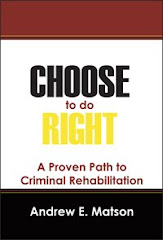As criminals, even when we are behaving responsibly, our thinking often minimizes the good in our actions. Due to the selfish motives behind our actions, responsible behavior can become an equivalent to crime in building up our self-image. When we are kind and helpful, it is often selfish - in that we expect something in return. We don’t just help to be helpful; we expect praise, recognition and indebtedness. Criminal equivalent behavior, although not criminal in nature, provides the same sense of power and excitement - the same boost to our self image – that we get from criminal behavior.
Due to our distorted point of view and the ulterior motives behind most of our behaviors, many of our thoughts and actions play the role of criminal equivalents. Basically, whether or not a thought or behavior is a criminal equivalent depends on its motive. If it is self-promoting or self-serving, then it is a criminal equivalent in that it is solely intended to boost an unrealistic self-image or quench a thirst for power and excitement.
Criminal equivalent behaviors can be seen in all aspects of our lives. When we are not involved in crime, they become the only way we can maintain our self-image and quench our thirst for power and excitement. They are demonstrated in our pretentiousness, our perfectionism, and in our desire to always be in charge. They can be seen in the way we give up when things don’t go our way. They are illustrated in our humor, which is often at the expense of others.
The problem with criminal equivalent behavior is that it is that we don't experience the same sense of joy and satisfaction that people often get from serving others. Because we seek only the material and physical rewards of our actions we don't experience any of the spiritual or emotional rewards. And, our reputation with ourselves suffers.
http://www.choosetodoright.com/
Subscribe to:
Post Comments (Atom)


No comments:
Post a Comment